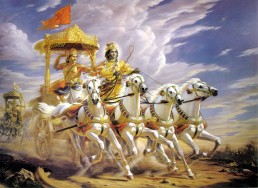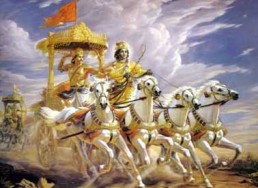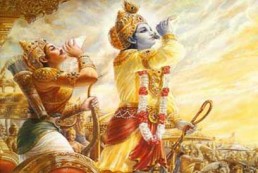Bhagavad Gita-Chapter 18 All Verses with Meaning and Audio
संन्यासस्य महाबाहो तत्त्वमिच्छामि वेदितुम् ।
त्यागस्य च हृषीकेश पृथक्केशिनिषूदन ॥ १८-१॥
saṃnyāsasya mahābāho tattvamicchāmi veditum
tyāgasya ca hṛṣīkeśa pṛthakkeśiniṣūdana 18-1
काम्यानां कर्मणां न्यासं संन्यासं कवयो विदुः ।
सर्वकर्मफलत्यागं प्राहुस्त्यागं विचक्षणाः ॥ १८-२॥
kāmyānāṃ karmaṇāṃ nyāsaṃ saṃnyāsaṃ kavayo viduḥ
sarvakarmaphalatyāgaṃ prāhustyāgaṃ vicakṣaṇāḥ 18-2
यज्ञदानतपःकर्म न त्याज्यमिति चापरे ॥ १८-३॥
yajñadānatapaḥkarma na tyājyamiti cāpare 18-3
त्यागो हि पुरुषव्याघ्र त्रिविधः सम्प्रकीर्तितः ॥ १८-४॥
tyāgo hi puruṣavyāghra trividhaḥ samprakīrtitaḥ 18-4
यज्ञो दानं तपश्चैव पावनानि मनीषिणाम् ॥ १८-५॥
yajño dānaṃ tapaścaiva pāvanāni manīṣiṇām 18-5
कर्तव्यानीति मे पार्थ निश्चितं मतमुत्तमम् ॥ १८-६॥
kartavyānīti me pārtha niścitaṃ matamuttamam 18-6
मोहात्तस्य परित्यागस्तामसः परिकीर्तितः ॥ १८-७॥
mohāttasya parityāgastāmasaḥ parikīrtitaḥ 18-7
स कृत्वा राजसं त्यागं नैव त्यागफलं लभेत् ॥ १८-८॥
sa kṛtvā rājasaṃ tyāgaṃ naiva tyāgaphalaṃ labhet 18-8
सङ्गं त्यक्त्वा फलं चैव स त्यागः सात्त्विको मतः ॥ १८-९॥
saṅgaṃ tyaktvā phalaṃ caiva sa tyāgaḥ sāttviko mataḥ 18-9
त्यागी सत्त्वसमाविष्टो मेधावी छिन्नसंशयः ॥ १८-१०॥
tyāgī sattvasamāviṣṭo medhāvī chinnasaṃśayaḥ 18-10
यस्तु कर्मफलत्यागी स त्यागीत्यभिधीयते ॥ १८-११॥
yastu karmaphalatyāgī sa tyāgītyabhidhīyate 18-11
भवत्यत्यागिनां प्रेत्य न तु संन्यासिनां क्वचित् ॥ १८-१२॥
bhavatyatyāgināṃ pretya na tu saṃnyāsināṃ kvacit 18-12
साङ्ख्ये कृतान्ते प्रोक्तानि सिद्धये सर्वकर्मणाम् ॥ १८-१३॥
sāṅkhye kṛtānte proktāni siddhaye sarvakarmaṇām 18-13
विविधाश्च पृथक्चेष्टा दैवं चैवात्र पञ्चमम् ॥ १८-१४॥
vividhāśca pṛthakceṣṭā daivaṃ caivātra pañcamam 18-14
न्याय्यं वा विपरीतं वा पञ्चैते तस्य हेतवः ॥ १८-१५॥
nyāyyaṃ vā viparītaṃ vā pañcaite tasya hetavaḥ 18-15
पश्यत्यकृतबुद्धित्वान्न स पश्यति दुर्मतिः ॥ १८-१६॥
paśyatyakṛtabuddhitvānna sa paśyati durmatiḥ 18-16
हत्वाऽपि स इमाँल्लोकान्न हन्ति न निबध्यते ॥ १८-१७॥
hatvā’pi sa imām̐llokānna hanti na nibadhyate 18-17
करणं कर्म कर्तेति त्रिविधः कर्मसङ्ग्रहः ॥ १८-१८॥
karaṇaṃ karma karteti trividhaḥ karmasaṅgrahaḥ 18-18
प्रोच्यते गुणसङ्ख्याने यथावच्छृणु तान्यपि ॥ १८-१९॥
procyate guṇasaṅkhyāne yathāvacchṛṇu tānyapi 18-19
अविभक्तं विभक्तेषु तज्ज्ञानं विद्धि सात्त्विकम् ॥ १८-२०॥
avibhaktaṃ vibhakteṣu tajjñānaṃ viddhi sāttvikam 18-20
वेत्ति सर्वेषु भूतेषु तज्ज्ञानं विद्धि राजसम् ॥ १८-२१॥
vetti sarveṣu bhūteṣu tajjñānaṃ viddhi rājasam 18-21
अतत्त्वार्थवदल्पं च तत्तामसमुदाहृतम् ॥ १८-२२॥
atattvārthavadalpaṃ ca tattāmasamudāhṛtam 18-22
अफलप्रेप्सुना कर्म यत्तत्सात्त्विकमुच्यते ॥ १८-२३॥
aphalaprepsunā karma yattatsāttvikamucyate 18-23
क्रियते बहुलायासं तद्राजसमुदाहृतम् ॥ १८-२४॥
kriyate bahulāyāsaṃ tadrājasamudāhṛtam 18-24
मोहादारभ्यते कर्म यत्तत्तामसमुच्यते ॥ १८-२५॥
mohādārabhyate karma yattattāmasamucyate 18-25
सिद्ध्यसिद्ध्योर्निर्विकारः कर्ता सात्त्विक उच्यते ॥ १८-२६॥
siddhyasiddhyornirvikāraḥ kartā sāttvika ucyate 18-26
हर्षशोकान्वितः कर्ता राजसः परिकीर्तितः ॥ १८-२७॥
harṣaśokānvitaḥ kartā rājasaḥ parikīrtitaḥ 18-27
विषादी दीर्घसूत्री च कर्ता तामस उच्यते ॥ १८-२८॥
viṣādī dīrghasūtrī ca kartā tāmasa ucyate 18-28
प्रोच्यमानमशेषेण पृथक्त्वेन धनञ्जय ॥ १८-२९॥
procyamānamaśeṣeṇa pṛthaktvena dhanañjaya 18-29
बन्धं मोक्षं च या वेत्ति बुद्धिः सा पार्थ सात्त्विकी ॥ १८-३०॥
bandhaṃ mokṣaṃ ca yā vetti buddhiḥ sā pārtha sāttvikī 18-30
अयथावत्प्रजानाति बुद्धिः सा पार्थ राजसी ॥ १८-३१॥
ayathāvatprajānāti buddhiḥ sā pārtha rājasī 18-31
सर्वार्थान्विपरीतांश्च बुद्धिः सा पार्थ तामसी ॥ १८-३२॥
sarvārthānviparītāṃśca buddhiḥ sā pārtha tāmasī 18-32
योगेनाव्यभिचारिण्या धृतिः सा पार्थ सात्त्विकी ॥ १८-३३॥
yogenāvyabhicāriṇyā dhṛtiḥ sā pārtha sāttvikī 18-33
प्रसङ्गेन फलाकाङ्क्षी धृतिः सा पार्थ राजसी ॥ १८-३४॥
prasaṅgena phalākāṅkṣī dhṛtiḥ sā pārtha rājasī 18-34
न विमुञ्चति दुर्मेधा धृतिः सा पार्थ तामसी ॥ १८-३५॥
na vimuñcati durmedhā dhṛtiḥ sā pārtha tāmasī 18-35
अभ्यासाद्रमते यत्र दुःखान्तं च निगच्छति ॥ १८-३६॥
abhyāsādramate yatra duḥkhāntaṃ ca nigacchati 18-36
तत्सुखं सात्त्विकं प्रोक्तमात्मबुद्धिप्रसादजम् ॥ १८-३७॥
tatsukhaṃ sāttvikaṃ proktamātmabuddhiprasādajam 18-37
परिणामे विषमिव तत्सुखं राजसं स्मृतम् ॥ १८-३८॥
pariṇāme viṣamiva tatsukhaṃ rājasaṃ smṛtam 18-38
निद्रालस्यप्रमादोत्थं तत्तामसमुदाहृतम् ॥ १८-३९॥
nidrālasyapramādotthaṃ tattāmasamudāhṛtam 18-39
सत्त्वं प्रकृतिजैर्मुक्तं यदेभिः स्यात्त्रिभिर्गुणैः ॥ १८-४०॥
sattvaṃ prakṛtijairmuktaṃ yadebhiḥ syāttribhirguṇaiḥ 18-40
कर्माणि प्रविभक्तानि स्वभावप्रभवैर्गुणैः ॥ १८-४१॥
karmāṇi pravibhaktāni svabhāvaprabhavairguṇaiḥ 18-41
ज्ञानं विज्ञानमास्तिक्यं ब्रह्मकर्म स्वभावजम् ॥ १८-४२॥
jñānaṃ vijñānamāstikyaṃ brahmakarma svabhāvajam 18-42
दानमीश्वरभावश्च क्षात्रं कर्म स्वभावजम् ॥ १८-४३॥
dānamīśvarabhāvaśca kṣātraṃ karma svabhāvajam 18-43
परिचर्यात्मकं कर्म शूद्रस्यापि स्वभावजम् ॥ १८-४४॥
paricaryātmakaṃ karma śūdrasyāpi svabhāvajam 18-44
स्वकर्मनिरतः सिद्धिं यथा विन्दति तच्छृणु ॥ १८-४५॥
svakarmanirataḥ siddhiṃ yathā vindati tacchṛṇu 18-45
स्वकर्मणा तमभ्यर्च्य सिद्धिं विन्दति मानवः ॥ १८-४६॥
svakarmaṇā tamabhyarcya siddhiṃ vindati mānavaḥ 18-46
स्वभावनियतं कर्म कुर्वन्नाप्नोति किल्बिषम् ॥ १८-४७॥
svabhāvaniyataṃ karma kurvannāpnoti kilbiṣam 18-47
सर्वारम्भा हि दोषेण धूमेनाग्निरिवावृताः ॥ १८-४८॥
sarvārambhā hi doṣeṇa dhūmenāgnirivāvṛtāḥ 18-48
नैष्कर्म्यसिद्धिं परमां संन्यासेनाधिगच्छति ॥ १८-४९॥
naiṣkarmyasiddhiṃ paramāṃ saṃnyāsenādhigacchati 18-49
समासेनैव कौन्तेय निष्ठा ज्ञानस्य या परा ॥ १८-५०॥
samāsenaiva kaunteya niṣṭhā jñānasya yā parā 18-50
शब्दादीन्विषयांस्त्यक्त्वा रागद्वेषौ व्युदस्य च ॥ १८-५१॥
śabdādīnviṣayāṃstyaktvā rāgadveṣau vyudasya ca 18-51
ध्यानयोगपरो नित्यं वैराग्यं समुपाश्रितः ॥ १८-५२॥
dhyānayogaparo nityaṃ vairāgyaṃ samupāśritaḥ 18-52
विमुच्य निर्ममः शान्तो ब्रह्मभूयाय कल्पते ॥ १८-५३॥
vimucya nirmamaḥ śānto brahmabhūyāya kalpate 18-53
समः सर्वेषु भूतेषु मद्भक्तिं लभते पराम् ॥ १८-५४॥
samaḥ sarveṣu bhūteṣu madbhaktiṃ labhate parām 18-54
ततो मां तत्त्वतो ज्ञात्वा विशते तदनन्तरम् ॥ १८-५५॥
tato māṃ tattvato jñātvā viśate tadanantaram 18-55
मत्प्रसादादवाप्नोति शाश्वतं पदमव्ययम् ॥ १८-५६॥
matprasādādavāpnoti śāśvataṃ padamavyayam 18-56
बुद्धियोगमुपाश्रित्य मच्चित्तः सततं भव ॥ १८-५७॥
buddhiyogamupāśritya maccittaḥ satataṃ bhava 18-57
अथ चेत्त्वमहङ्कारान्न श्रोष्यसि विनङ्क्ष्यसि ॥ १८-५८॥
atha cettvamahaṅkārānna śroṣyasi vinaṅkṣyasi 18-58
मिथ्यैष व्यवसायस्ते प्रकृतिस्त्वां नियोक्ष्यति ॥ १८-५९॥
mithyaiṣa vyavasāyaste prakṛtistvāṃ niyokṣyati 18-59
कर्तुं नेच्छसि यन्मोहात्करिष्यस्यवशोऽपि तत् ॥ १८-६०॥
kartuṃ necchasi yanmohātkariṣyasyavaśo’pi tat 18-60
भ्रामयन्सर्वभूतानि यन्त्रारूढानि मायया ॥ १८-६१॥
bhrāmayansarvabhūtāni yantrārūḍhāni māyayā 18-61
तत्प्रसादात्परां शान्तिं स्थानं प्राप्स्यसि शाश्वतम् ॥ १८-६२॥
tatprasādātparāṃ śāntiṃ sthānaṃ prāpsyasi śāśvatam 18-62
विमृश्यैतदशेषेण यथेच्छसि तथा कुरु ॥ १८-६३॥
vimṛśyaitadaśeṣeṇa yathecchasi tathā kuru 18-63
इष्टोऽसि मे दृढमिति ततो वक्ष्यामि ते हितम् ॥ १८-६४॥
iṣṭo’si me dṛḍhamiti tato vakṣyāmi te hitam 18-64
मामेवैष्यसि सत्यं ते प्रतिजाने प्रियोऽसि मे ॥ १८-६५॥
māmevaiṣyasi satyaṃ te pratijāne priyo’si me 18-65
अहं त्वा सर्वपापेभ्यो मोक्षयिष्यामि मा शुचः ॥ १८-६६॥
ahaṃ tvā sarvapāpebhyo mokṣayiṣyāmi mā śucaḥ 18-66
न चाशुश्रूषवे वाच्यं न च मां योऽभ्यसूयति ॥ १८-६७॥
na cāśuśrūṣave vācyaṃ na ca māṃ yo’bhyasūyati 18-67
भक्तिं मयि परां कृत्वा मामेवैष्यत्यसंशयः ॥ १८-६८॥
bhaktiṃ mayi parāṃ kṛtvā māmevaiṣyatyasaṃśayaḥ 18-68
भविता न च मे तस्मादन्यः प्रियतरो भुवि ॥ १८-६९॥
bhavitā na ca me tasmādanyaḥ priyataro bhuvi 18-69
ज्ञानयज्ञेन तेनाहमिष्टः स्यामिति मे मतिः ॥ १८-७०॥
jñānayajñena tenāhamiṣṭaḥ syāmiti me matiḥ 18-70
सोऽपि मुक्तः शुभाँल्लोकान्प्राप्नुयात्पुण्यकर्मणाम् ॥ १८-७१॥
so’pi muktaḥ śubhām̐llokān prāpnuyātpuṇyakarmaṇām 18-71
कच्चिदज्ञानसम्मोहः प्रनष्टस्ते धनञ्जय ॥ १८-७२॥
kaccidajñānasammohaḥ pranaṣṭaste dhanañjaya 18-72
नष्टो मोहः स्मृतिर्लब्धा त्वत्प्रसादान्मयाच्युत ।
स्थितोऽस्मि गतसन्देहः करिष्ये वचनं तव ॥ १८-७३॥
naṣṭo mohaḥ smṛtirlabdhā tvatprasādānmayācyuta
sthito’smi gatasandehaḥ kariṣye vacanaṃ tava 18-73
इत्यहं वासुदेवस्य पार्थस्य च महात्मनः ।
संवादमिममश्रौषमद्भुतं रोमहर्षणम् ॥ १८-७४॥
ityahaṃ vāsudevasya pārthasya ca mahātmanaḥ
saṃvādamimamaśrauṣamadbhutaṃ romaharṣaṇam 18-74
योगं योगेश्वरात्कृष्णात्साक्षात्कथयतः स्वयम् ॥ १८-७५॥
yogaṃ yogeśvarātkṛṣṇāt sākṣātkathayataḥ svayam 18-75
केशवार्जुनयोः पुण्यं हृष्यामि च मुहुर्मुहुः ॥ १८-७६॥
keśavārjunayoḥ puṇyaṃ hṛṣyāmi ca muhurmuhuḥ 18-76
विस्मयो मे महान् राजन्हृष्यामि च पुनः पुनः ॥ १८-७७॥
vismayo me mahān rājanhṛṣyāmi ca punaḥ punaḥ 18-77
तत्र श्रीर्विजयो भूतिर्ध्रुवा नीतिर्मतिर्मम ॥ १८-७८॥
ॐ तत्सदिति श्रीमद्भगवद्गीतासूपनिषत्सु
ब्रह्मविद्यायां योगशास्त्रे श्रीकृष्णार्जुनसंवादे
मोक्षसंन्यासयोगो नाम अष्टादशोऽध्यायः ॥ १८॥
tatra śrīrvijayo bhūtirdhruvā nītirmatirmama 18-78
oṃ tatsaditi śrīmadbhagavadgītāsūpaniṣatsu
brahmavidyāyāṃ yogaśāstre śrīkṛṣṇārjunasaṃvāde
mokṣasaṃnyāsayogo nāma aṣṭādaśo’dhyāyaḥ 18
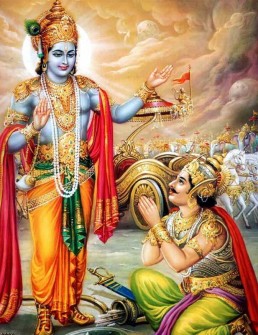
Description
Bhagavad Gita Chapter 18 Summary
Mokṣa-Yoga – The Yoga of Liberation
The concluding chapter of the Gita is essentially a summary of the entire Song of the Lord. In response to Arjuna’s opening question, the Lord differentiates mere abandonment from true renunciation and explains that renunciation of the false identification with matter and surrender to the Lord is guaranteed to lead us to Liberation. Below are the main themes of Chapter 18:
Verses 1 – 12
Sannyāsa and tyāga
Verses 13 – 17
Jñānayoga
Verses 18 – 40
Three types of knowledge, action, doer, intellect, will and hap-piness
Verses 41 – 49
Karmayoga (emphasizing svadharma)
Verses 50 – 55
Jñānayoga (emphasizing meditation)
Verses 56 – 62
Karmayoga (emphasizing devotion)
Verses 63 – 66
Final summary
Verses 67 – 73
Lord’s concluding remarks
Verses 74 – 78
Sañjaya’s concluding remarks
Gita Chapter 18 – Commentary by Swami Paramarthananda
Background
Lord Krishna dealt with Self-knowledge in the XIII, XIV and XV chapters. In the XVI and XVII chapters were discussed the values without which the mind will not be fit to receive the knowledge of the Self. With this, the Lord has exhaustively dealt with all the aspects of vedantic teaching.
In such a situation, Arjuna puts his last question to Krishna seeking to clarify the difference between sannyāsa and tyāga. Now begins the XVIII chapter answering Arjuna’s question. Bhagavān takes this opportunity to sum up His entire teaching which has been spread over the last sixteen chapters.
The chapter begins with Arjuna’s question — “Oh Lord! I desire to know the true nature of sannyāsa and tyāga distinctly” (1). Krishna replies by citing the views of some people (2, 3). The Lord gives his verdict from the 4th verse onwards. Bhagavān does not differentiate sannyāsa and tyāga. (This indicates that they are not different according to the Lord.) Krishna emphasizes the importance of obligatory rites (nityakarma) like yajña, dāna and tapas, and asserts that they should never be given up (5, 6) (We should note that this advice is given to people with impurity. Śāstras allow a person with purity to renounce nityakarma also). In the next three verses, the Lord divides renunciation into three types — tamasic, rajasic and sattvic. (For details see the chart)
In the following verses, Bhagavān glorifies sattvic renunciation. (In fact, sattvic renunciation is nothing but karmayoga.) A karmayogī renounces all the results of action. In due course he gets Self-knowledge. He is not affected by the consequences whether they are good, evil or a mixture of both (10 to 12).
From the 13th to the 17th verse, Krishna gives a gist of jñānayoga. Five factors are involved in every action — the body, prāṇa, the mind with sense organs, the ego and the presiding divinity of all these. (In short, they are the four kośās and the presiding divinity) (13, 14). All actions, good or evil, are accomplished through these five factors only (15). The Self is not involved in any action. But, due to identification with the above factors, one mistakes oneself to be a doer (16). On the other hand, the wiseman, who does not have the false ‘I’ (ahaṅkāra) born of identification, is free from all karmas in spite of the activities of his equipments. He is neither a doer, nor an enjoyer (17).
Taking a diversion, Bhagavān introduces six factors necessary for any vyavahāra (transaction). They are — knower, knowledge, known, doer, action and the instrument of action (18). Of these six factors, Krishna takes up three (knowledge, action and doer) for further division based on the three guṇas (19). Later, the Lord divides the intellect and will also on the same basis (29). Finally, Krishna talks about three types of happiness (36). (For details see the chart)
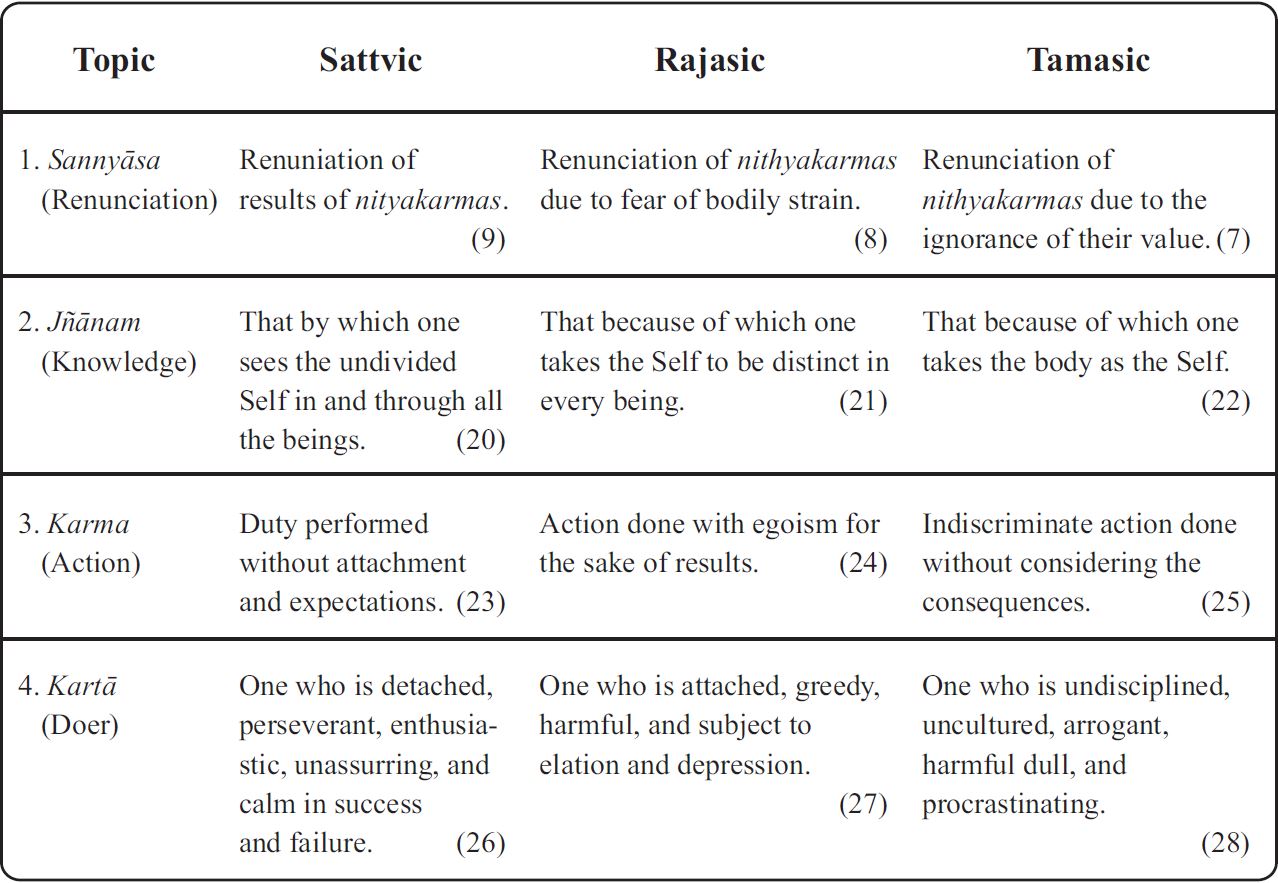
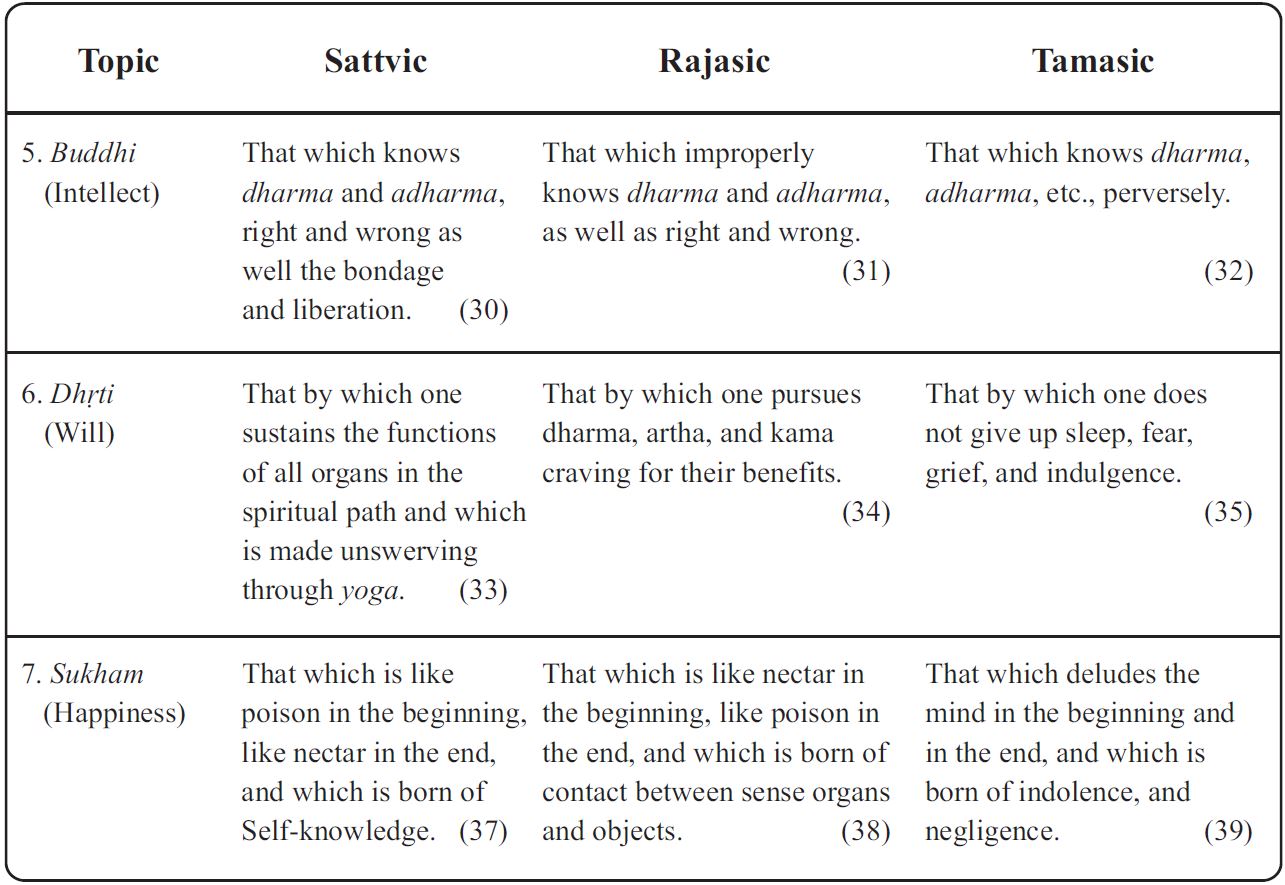 Krishna
Krishna
Krishna concludes this topic by pointing out that there is nothing in the creation which is free from these three guṇas (40).
With an intention to sum up the entire Gītā-teaching, Bhagavān gives the essence of karmayoga (41 to 49) and jñānayoga (50 to 55) in the following section.
Having thus concluded the teaching, the Lord states the qualifications necessary to receive this. One who has no faith, discipline, devotion and desire to know should not be given this knowledge (67).The duties of the four varṇas (brāhmaṇas, kṣatriyas, vaiśyas and śūdras) are prescribed in the scriptures based on their nature (41 to 44). Karmayoga is the performance of one’s own duty as an offering to the Lord. This renders the mind fit for knowledge (45, 46). Here, Krishna makes it a point to emphasize the importance of svadharma (duty). It is necessary not only for the sake of purity but for the sake of social harmony also. Shriking one’s duty can only lead to total confusion (47, 48). The purified seeker, who is detached and self-controlled, will soon attain liberation through jñānayoga (40).
Now the Lord introduces jñānayoga and gives a brief outline of meditation i.e. nididhyāsanam (which is necessary to assimilate the knowledge gained through śravaṇam and mananam). Having restrained all organs and having given up all disturbing thoughts like desire, anger etc., one should remain in a secluded place (51 to 53). Being firmly established in his Brahmannature, he becomes free from grief and desire. Being the same to all beings, he enjoys the highest devotion to the Lord (54). Having known the Lord in His true nature, he becomes one with Him (55). (Becoming one is nothing but dropping the notion of division.)
In the following verses (56 to 63), Krishna comes back to karmayoga, emphasizing the aspect of devotion i.e. the attitude of surrender. Constantly remembering the Lord, if one dedicates all his actions to Him, that devotee attains the Lord ultimately by effortlessly crossing over all obstacles (56 to 58). On the other hand, if one tries to evade his duty, which is based on his nature, it will be in vain and harmful (58 to 60). Hence, surrendering to the Lord of the heart, the controller of all, a devotee should strive to attain supreme peace by His grace (61 to 62). With this, Bhagavān concludes the teaching and directs Arjuna to do whatever he likes (63). But, the affection towards Arjuna overpowers Krishna once again (64). Hence, the Lord repeats His teaching emphatically once again — “Fix the mind on Me. (Be) My devotee. (Be) My worshiper. Surrender to Me. You shall reach Me alone. Truly do I promise to you. You are dear to Me. Having renounced all actions, seek Me, the nondual, (as your) shelter. I shall liberate you from all sins. Do not grieve” (65, 66). (These two verses are presenting karmayoga and jñānayoga in capsule form.)
Now comes the phalam. One who imparts and the one who receives this wisdom attain the Lord Himself (68 to 70). Even the one who merely hears this with faith attains higher worlds (71).
Being satisfied with the teaching, Krishna asks Arjuna whether his delusion is gone. Arjuna gratefully acknowledges, promising to abide by the Lord’s teaching (72, 73).
Now Sañjaya addresses Dhṛtarāṣṭra, exclaiming how blessed he was to listen to this glorious dialogue between the Lord and Arjuna (74, 75). Sañjaya remembers the whole dialogue and the cosmic vision with thrill (76, 77). He concludes his remarks with the declaration — “Where there is Krishna, the Lord of yoga, and where there is Arjuna, the wielder of the bow, there will be permanent wealth, victory, prosperity and justice” (78).
Gita 18th Chapter – Main Points
Sannyāsa and tyāga: 1 to 12
Jñānayoga: 13 to 17
Three types of knowledge, action, doer, intellect, will and happiness: 18 to 40
Karmayoga (emphasizing svadharma): 41 to 49
Jñānayoga (emphasizing meditation): 50 to 55
Karmayoga (emphasizing devotion): 56 to 62
Final summary: 63 to 66
Lord’s concluding remarks: 67 to 73
Sañjaya’s concluding remarks: 74 to 78
Since the chapter begins with Sannyāsa which is the means of liberation, it is called Mokṣa Sannyāsa yoga.
Other Bhagavad Gita Shlokams
Bhagavad Gita
The Bhagavad Gita, or the Song of the Lord, is a dialogue between Krishna, an incarnation of Vishnu, and his friend and disciple, Arjuna. Composed of 701 Shlokas arranged in 18 chapters, the Gita is one of the best-known philosophical texts of…
Bhagavad Gita-Chapter 01 All Verses with Meaning and Audio
Bhagavad Gita Chapter 1 All Verses for easy chanting along with Audio and Meaning. Lyrics In English, Sanskrit, Hindi, Telugu, Tamil, Gujarati, Bengali and many more languages.
Bhagavad Gita-Chapter 02 All Verses with Meaning and Audio
Bhagavad Gita Chapter 2 All Verses for easy chanting along with Audio and Meaning. Lyrics In English, Sanskrit, Hindi, Telugu, Tamil, Gujarati, Bengali and many more languages.
Bhagavad Gita-Chapter 03 All Verses with Meaning and Audio
Bhagavad Gita Chapter 3 All Verses for easy chanting along with Audio and Meaning. Lyrics In English, Sanskrit, Hindi, Telugu, Tamil, Gujarati, Bengali and many more languages.
Bhagavad Gita-Chapter 04 All Verses with Meaning and Audio
Bhagavad Gita Chapter 4 All Verses for easy chanting along with Audio and Meaning. Lyrics In English, Sanskrit, Hindi, Telugu, Tamil, Gujarati, Bengali and many more languages.
Bhagavad Gita-Chapter 05 All Verses with Meaning and Audio
Bhagavad Gita Chapter 5 All Verses for easy chanting along with Audio and Meaning. Lyrics In English, Sanskrit, Hindi, Telugu, Tamil, Gujarati, Bengali and many more languages.
Bhagavad Gita-Chapter 06 All Verses with Meaning and Audio
Bhagavad Gita Chapter 6 All Verses for easy chanting along with Audio and Meaning. Lyrics In English, Sanskrit, Hindi, Telugu, Tamil, Gujarati, Bengali and many more languages.
Bhagavad Gita-Chapter 07 All Verses with Meaning and Audio
Bhagavad Gita Chapter 7 All Verses for easy chanting along with Audio and Meaning. Lyrics In English, Sanskrit, Hindi, Telugu, Tamil, Gujarati, Bengali and many more languages.
Bhagavad Gita-Chapter 08 All Verses with Meaning and Audio
Bhagavad Gita Chapter 8 All Verses for easy chanting along with Audio and Meaning. Lyrics In English, Sanskrit, Hindi, Telugu, Tamil, Gujarati, Bengali and many more languages.
Bhagavad Gita-Chapter 09 All Verses with Meaning and Audio
Bhagavad Gita Chapter 9 All Verses for easy chanting along with Audio and Meaning. Lyrics In English, Sanskrit, Hindi, Telugu, Tamil, Gujarati, Bengali and many more languages.
Bhagavad Gita-Chapter 10 All Verses with Meaning and Audio
Bhagavad Gita Chapter 10 All Verses for easy chanting along with Audio and Meaning. Lyrics In English, Sanskrit, Hindi, Telugu, Tamil, Gujarati, Bengali and many more languages.
Bhagavad Gita-Chapter 11 All Verses with Meaning and Audio
Bhagavad Gita Chapter 11 All Verses for easy chanting along with Audio and Meaning. Lyrics In English, Sanskrit, Hindi, Telugu, Tamil, Gujarati, Bengali and many more languages.
Bhagavad Gita-Chapter 12 All Verses with Meaning and Audio
Bhagavad Gita Chapter 12 All Verses for easy chanting along with Audio and Meaning. Lyrics In English, Sanskrit, Hindi, Telugu, Tamil, Gujarati, Bengali and many more languages.
Bhagavad Gita-Chapter 13 All Verses with Meaning and Audio
Bhagavad Gita Chapter 13 All Verses for easy chanting along with Audio and Meaning. Lyrics In English, Sanskrit, Hindi, Telugu, Tamil, Gujarati, Bengali and many more languages.
Bhagavad Gita-Chapter 14 All Verses with Meaning and Audio
Bhagavad Gita Chapter 14 All Verses for easy chanting along with Audio and Meaning. Lyrics In English, Sanskrit, Hindi, Telugu, Tamil, Gujarati, Bengali and many more languages.
Bhagavad Gita-Chapter 15 All Verses with Meaning and Audio
Bhagavad Gita Chapter 15 All Verses for easy chanting along with Audio and Meaning. Lyrics In English, Sanskrit, Hindi, Telugu, Tamil, Gujarati, Bengali and many more languages.
Bhagavad Gita-Chapter 16 All Verses with Meaning and Audio
Bhagavad Gita Chapter 16 All Verses for easy chanting along with Audio and Meaning. Lyrics In English, Sanskrit, Hindi, Telugu, Tamil, Gujarati, Bengali and many more languages.
Bhagavad Gita-Chapter 17 All Verses with Meaning and Audio
Bhagavad Gita Chapter 17 All Verses for easy chanting along with Audio and Meaning. Lyrics In English, Sanskrit, Hindi, Telugu, Tamil, Gujarati, Bengali and many more languages.
Gita Dhyanam
The Gītā Dhyānam, also called the Gītā Dhyāna or the Dhyāna Ślokas associated with the Gītā, is a 9-verse Sanskrit poem that has often been attached to the Bhagavad Gita, one of the most important scr
Bhagavad Gita-Chapter 18 All Verses with Meaning and Audio – Bhagavad Gita – Bhagavad Gita Chapter 18 All Verses Easy Chanting with Audio and Meaning, Lyrics

